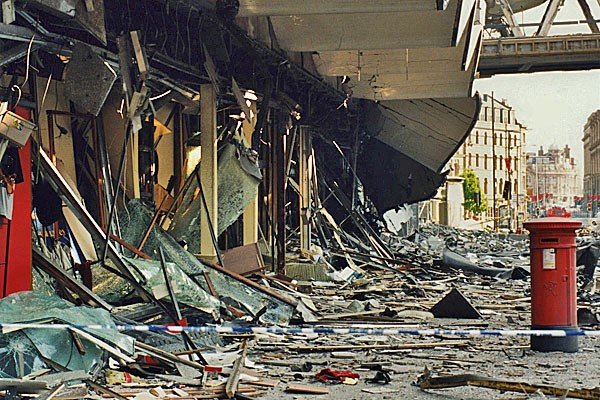THE city council have decided we shouldn't 'dwell' on what happened twenty years ago.
They've sent us this statement:
‘We do not forget the events of that day nor seek to downplay them. We recognise and respect the courage shown by the emergency services and Mancunians and the resilient spirit shown by the city. But nor do we choose to dwell on the events of June 15, 1996, every five years.
‘The regeneration of Manchester began in the early 1990s with the transformation of Hulme and the regeneration of the city centre was already gathering pace long before the bomb. While it is the case that some of these plans were further accelerated in the aftermath of the bomb, it is a myth that the IRA bomb somehow kick-started the regeneration of the city.
‘Other events from the Olympic bid and 2002 Commonwealth Games to Manchester International Festival to the opening and expansion of Metrolink and growth of Manchester Airports Groups to the city's increasing ability to attract international investment have had a much more significant impact on the regeneration of the city.
‘Rather than harking back to one moment in the city’s eventful history, we prefer as a council to look forward. Northern Ireland, in whose politics the bombing had its roots, has thankfully moved on. The world has moved on. Manchester has moved on.’
There’s an interesting choice of words in this statement: ‘harking back’, ‘dwell upon’, ‘moved on’. There is something wilful about this official ignoring of the IRA bomb, and apparently the Police are adopting the same attitude. It’s not a position many share.
History cannot be undone however unpleasant it is
There is to be a Radio 4 documentary about the subject. Other BBC TV and radio outlets will be covering the event. There will be countless newspaper articles.
Meanwhile there is to be a major event in Urbis this Wednesday and several events on the anniversary date of 15 June.
The Urbis event is a trailblazer for Manchester Histories Festival (3-12 June) and includes key figures associated with the rebuild of the affected areas such as Ian Simpson and Martha Schwartz. The festival is council supported and hosting a number of events centred on the ‘bomb’ including a production at HOME called On Corporation Street.
 The IRA's 1996 bomb left behind an estimated £700m of damage
The IRA's 1996 bomb left behind an estimated £700m of damageHistory cannot be undone however unpleasant it is. Just as families will mark key anniversaries, it is natural that countries and cities should do the same, and they usually do. Manchester will be the centre of the national commemorations for the Battle of the Somme on Friday 1 July. Ireland marked the anniversary of the Easter Rising this year. They were natural responses to major moments.
The IRA bomb of 1996 was just such a major moment for Manchester.
It is the most natural thing in the world to mark its significance two decades on which is why so many are doing so. Worse, this official silence passes up an excuse to explode a myth - if you forgive the expression. So, while the bomb was significant, it’s significance has been over-stated.
In the council statement there is a key paragraph.
It reads: ‘The regeneration of Manchester began in the early 1990s with the transformation of Hulme and the regeneration of the city centre was already gathering pace long before the bomb. While it is the case that some of these plans were further accelerated in the aftermath of the bomb, it is a myth that the IRA bomb somehow kick-started the regeneration of the city.’
Confidential whole heartedly agrees.
As I wrote last week, ‘The bomb wasn't the beginning of a resurgent Manchester. Truth is the city had already intellectually changed by the time that big June bang put things back rather than pushed them forward. Olympic bids, the council deciding to work in partnership with commerce rather than against it, the movement back to city centre living, the re-birth of an urban sensibility, had already seen the Manchester mood swing upwards.
‘Of course, the media love a simplistic start moment, it loves to turn history into a sound bite, but there's something peculiarly nasty about this myth. How can a bomb that creates £700m of damage and injures 212 people ever be a positive? Maybe ask those 212 people whether they feel glad to have been part of the event that 'changed Manchester'.’
The council being involved could have hammered this point home. It seems perverse to talk of not dwelling on the past, when cities are all about the stories they tell themselves and are told about them. By not taking part in this conversation about this aspect of the Manchester story the city council doesn’t help its cause in demolishing the idea of the city’s helplessness pre-bomb.
The most irritating aspect of the way the bomb’s affect has been treated nationally and even closer to home is the condescension implicit in the line that Manchester needed the 'leg-up' of the bomb and couldn't have changed without the booster the bomb gave. That’s a nonsense and the council and other agencies should be part of adjusting the received wisdom over this part of our story.
Manchester was always going to be strong enough to beat the vile terrorists with their narrow agendas, long memories and willingness to kill. Any civic commemoration of the IRA bomb would be celebrating resilience and forward-thinking, not history of which we'd rather wash our hands. Since we constantly examine, re-examine, and retell so much of the city's achievement and history, ignoring this episode seems simply wrong.













